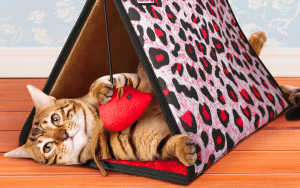
Cat Fostering 101 – Guide to Fostering Basics
So you gave your cat a new home, now what?
Taking in a foster kitty in need is one of the most rewarding, and stressful, things you can do. By stepping up to volunteer, you’re not only helping to free up space in your local shelter, but you’re also providing a safe space for vulnerable animals to develop into loving pets; free of the diseases and other stressors they might encounter in the shelter environment.
Reasons to Foster
There are a variety of reasons to bring a foster cat into your home. If you’re thinking about signing up to become a foster parent, here is a list of potential reasons that fostering might be right for you:
- You love cats and want to help them get acclimated to a healthy home environment, so they’re able to find their forever homes.
- Your home has a quiet space for the kitty, separate from your household pets.
- If you’re interested in fostering kittens, be sure you have plenty of free time and a flexible schedule for frequent feedings and other essential care.
Be Prepared
You can start preparing your home for foster kitties by setting aside a quiet space, whether that be an entire room you rarely use or a corner of your space for a large crate. Prepare the space by placing a litter box in one corner, a food bowl, and a warm bed. If you have other pets in the home, try to position the kitties where you will have the ability to keep them separated. Introductions, especially between the kittens and other cats, should be done slowly and under careful supervision (if at all).
When preparing your foster space make sure to move all valuables, remove any cords or wires that could be tempting to chew on, and move any houseplants out of reach. While your shelter will provide you with the necessary supplies, here is a general item checklist you’ll want to make sure you have:
- Litter Box
- Blankets or a cat bed
- Food and water bowls
- Toys
- Scratcher
If you are fostering kittens there are additional items you’ll need, like baby wipes, a heating pad, and kitten-specific food.
Tips for Fostering Kittens
Caring for kittens under eight weeks of age can be a whirlwind of basic needs, medical concerns, and unbelievable cuteness. Most shelters will offer training and educational materials to help demystify the process, but here are just a few quick tips to get you started:
- Understand the developmental milestones you should be reaching. Week by week your kittens will have different needs as they mature, for example, you can typically start introducing them to toys around week four, you can start weaning them during week five, etc.
- Your shelter will provide you with kitty litter, but if you are using clumping litter you still need to keep a close watch on your kittens to make sure they aren’t accidentally ingesting it. Due to the curious nature of kittens, a pellet-based litter is ideal.
- When introducing kittens to toys and play, start slow. They will be timid so you need to have patience, this is the ideal time to teach them healthy play habits — so never use your hands or fingers as toys.
The process might seem overwhelming, but it is important to vet all candidates to make sure they are ready for this short-term (but big) commitment.
Cats Need to Play
Play and enrichment can be used to redirect behaviors that are deemed inappropriate and channel the cat’s energy into a more constructive manner. Whether your cat is quiet and timid, or boisterous and confident, all cats need to play. Try out different toys and styles of play until you find what your cat likes best.
Here are a few essentials you should have in your home to enrich your cat mentally and physically while keeping them out of trouble.
Scratching Toys
Cats have a basic instinct to scratch and keep their nails short, so it’s important to provide non-destructive outlets for this need. Scratching posts and incline scratchers can save your doorframes and sofas from prying kitty nails. Try out a few different scratching options until you find what your kitty likes best.
Teasers
If you’ve ever caught your cat staring at birds out the window, then you know how much they love to stalk and hunt. Teaser toys mimic birds fluttering around; you’ll be able to satisfy their hunting instinct while bonding and interacting with your cat.
Wrestling Toys
Wrestling toys like Kickeroos provide cats with independent play and an opportunity to let out some of their playful energy while you’re busy cooking dinner. If you have multiple cats, it can also be a great idea to place wrestling toys in areas where they frequently have conflicts. Instead of chasing each other, your cats can wrestle the Kickeroo, letting out aggression in a healthy manner and keeping your home harmonious.
Catnip
We all know how funny cats can be around catnip, but did you know how enriching it can be to their mental well-being? While this won’t have any effect on kittens, adult cats will enjoy mental stimulation that will bust boredom by making their toys all the more appealing.
Preparing for Adoption
It can be really difficult to say goodbye to your foster pets, but it’s important to remember that you are providing a very valuable service to your local shelter. If you kept every foster then you wouldn’t have space left to help other animals in need, so trust that your shelter will work hard to place the animal in a loving forever home.
 from KONG Company
from KONG Company



